Micromobility options are increasing in Portland and across the country, with bike and scooter shares growing from novel pilot programs to mainstays in city transportation networks. Here in Portland, Biketown is the main player in micromobility with its expanding network that stretches beyond the city center.

This expansion is one way Biketown and the Portland Bureau of Transportation are working to improve access to bike rentals for all Portlanders so the program can have the most value to fill gaps in our current system. During a panel discussion at the 2022 Oregon Active Transportation Summit hosted by The Street Trust, policy experts shared their thoughts on how to further improve equity in the realm of micromobility and what they think is still holding us back from accomplishing a truly just transportation system.
PBOT Transportation Demand Management Specialist Roshin Kurian works closely with Biketown. As a member of the panel, she spoke about how bike and scooter share programs can provide a helpful resource for people reliant on public transportation and people who choose to not own a car.
“Bike share is operating 24/7. It’s there if you can’t wait on a bus or the MAX, and it’s just a really great option,” Kurian said.
“Kicking down those barriers is a really personal and nuanced case-by-case situation.”
— Cara Bader, Lyft
Biketown for All is a program that helps reduce or entirely get rid of the cost burdens associated bike share. Biketown also works to make its rentals available to people who have mobility restrictions with its Adaptive Biketown program. Still, there are some barriers that remain.
Kurian brought up some under-discussed reasons programs like Biketown remain inaccessible to some people. For example, she pointed out that people who don’t have bank accounts or who don’t want to connect their bank accounts to a program like Biketown because they fear it will charge unexpected fees, may struggle with the platform. She also mentioned that, although Biketown’s shift to e-bikes opened up access to a group of people who may have had a hard time using other, non-electric bikes, the community of people who benefit from the electric assist the most may consist of older people who aren’t as tech-savvy as younger folks.
Advertisement
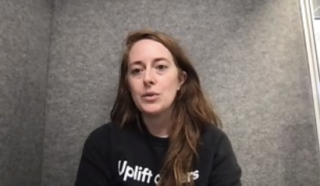
“There are a lot of many frustrating little pieces to overcome. So we try to be there in person to walk them through that process and close the loop between signing up and actually riding,” Kurian said.
One way Biketown “shows up in person” to help people use their services is through their partnership with PBOT’s Transportation Ambassador program, which consists of volunteers who manage community outreach events to spread the word about the program.
Cara Bader, who works at Lyft (Biketown’s owner and operator) to manage transportation policy for bike, scooter and transit programs across the country, talked about how connecting with people through methods like the Transportation Ambassador program allows Biketown to help people with their specific needs. She said a one-size-fits-all approach to services like this isn’t adequate because of how different communities have such different needs.
“Kicking down those barriers is a really personal and nuanced case-by-case situation. One of the ways it’s most effectively done is finding messengers that people know and trust who can really ally with them as a member of their communities,” Bader said.
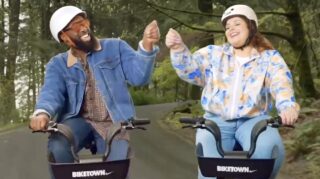
In the run-up to Earth Day weekend, Biketown launched a social media video that featured Jonathan Jones and local cycling influencer Jenna Phillips singing a campy duet that was widely shared and viewed. That marketing boost and perfect spring weather helped Biketown set new record highs for one-day trips. The system recorded 3,269 trips on Saturday and 3,096 trips on Sunday — both of which are way over the previous record high of 2,465 trips set last year.
Though cost is only one barrier, it can be a big one, and clearly people are interested in using the service if it’s available to them.
“Everyone deserves a right to access a safe and affordable way to move around the city that that we live in,” Kurian said. “We’re making sure that the needs of our community are at the forefront and that we’re collectively visualizing a place that’s more than just livable – we need to to feel connected to our city.”
The Oregon Active Transportation Summit continues today and Wednesday with speeches, panels, and in-person workshops. See the agenda here.



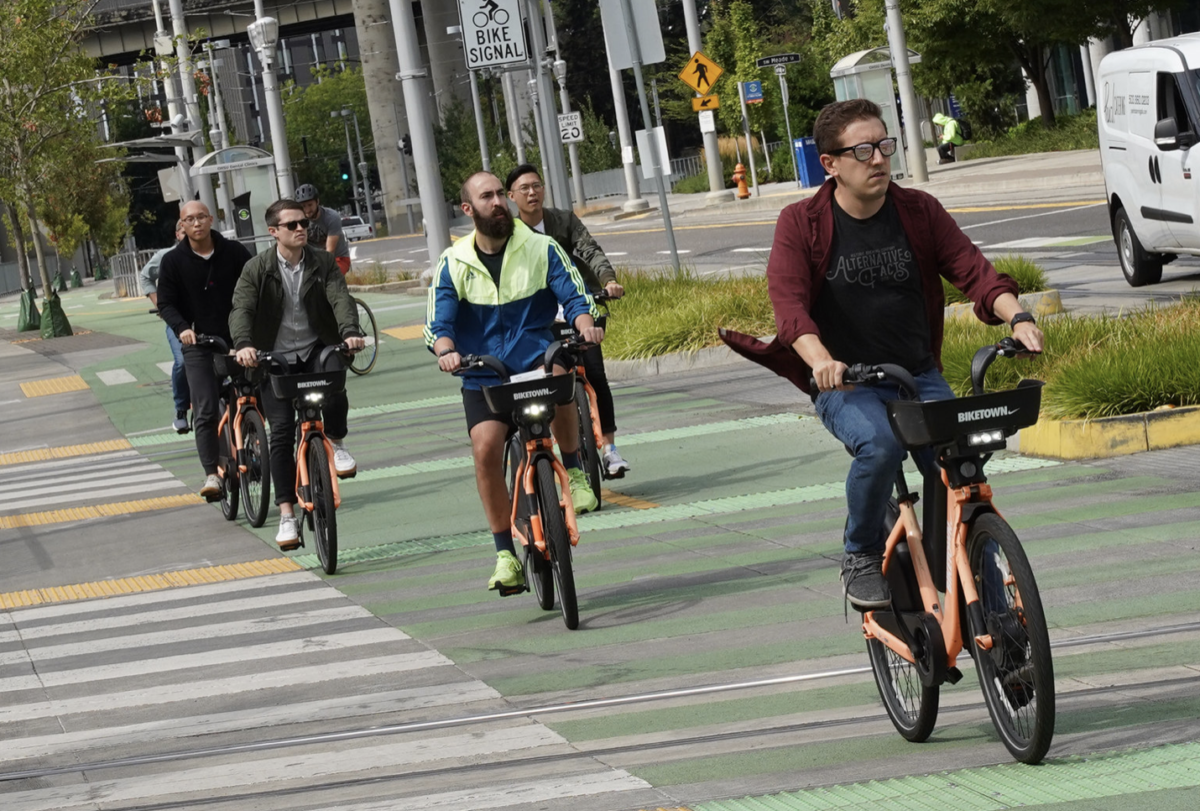
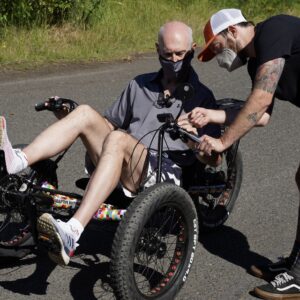
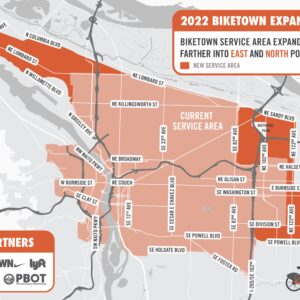


Thanks for reading.
BikePortland has served this community with independent community journalism since 2005. We rely on subscriptions from readers like you to survive. Your financial support is vital in keeping this valuable resource alive and well.
Please subscribe today to strengthen and expand our work.
Gating access to Biketown behind a smartphone app is a barrier to access for me, personally. I understand the reasons for this given Biketown is run by Lyft and in these modern times I am in the minority, but anything involving having to scan a QR code without an alternative access method is an immediate blocker. If there was something NFC-based like the TriMet Hop Card then literally anyone could be handed a card and given the freedom to jump on.
You’re not alone!
I’m not sure if it applies to only those enrolled in the ‘biketown for all’ program, but it looks like you can request a card.
From the site:
“If you don’t have a smartphone, email biketownforall@lyft.com to provide a shipping address to receive your BIKETOWN card”
May be worth a shot.
Thanks! I didn’t realize they were providing that option for some people. I reached out to Lyft support to see if that could be an option.
Maybe Metro/Portland/TriMet should come out with a SINGLE card, the “Use Gov” (TM) card, that is accepted by all the various services in town (library, transit, selfserv bikes, etc). A new public services comes to town it has to be compatible with the “Use Gov” card. It should also be FREE to obtain. If someone wants to tie a credit card to it, great. If someone wants to go to a kiosk and add $10 to it, even better. Etc.
Technology (even in our “techy” society”) should never ever be a barrier.
It’s silly for someone to have to carry a variety of cards for the various government/public services to pay for something or use.
Yes, I have an NFC enabled cell phone now, but I used to not, and I thought it was rediculous I would have to pay $3 to get the Hop Card (I don’t know if that fee still applies or not) just to then add money to, to get on TriMet.
One card for these services is a fantastic idea. I really wish we could do that.
Switching to all e-Bikes and doubling the per-minute fee has increased the cost of Biketown so that it is less competitive with competitors. For 1 person it’s still affordable, and I still use it alone, but for 2 it can cost as much as a Lyft or Uber, and for a family of 3 or 4 it would be more expensive.
I would encourage PBOT and Metro to consider promoting a second bike-share system which uses cheaper pedal-powered bikes, at a lower cost per ride, or working with Biketown to make both options available again in the same system. This is feasible; New York’s bike share has both e-bikes and regular bikes.
Deprivatize it and make it a public transportation system (free or almost free).
A system to maximize profit rather than provide efficient and equitable transportation is going to maximize profit rather than provide efficient and equitable transportation.
— paraphrase of E Swain quote
If one takes the long view of transportation history…comparing shared bikes/ bike transit to public transit…many US cities with bikeshare would be in the “1920s to 1940s” era…with private companies operating a municipal license for a local mobility service (streetcar, trolly bus, ferry, gas bus etc.) with competing private auto ownership in the marketplace and de-risking a ‘technology’ while providing a strong option to car ownership / operation for those that cannot or will not. For many of the “enhancements” and lower user fees discussed in this tread AND maturing system sustainability the Federal Government and US Congress MUST pass the Bike Transit Act that Portland’s Blumenaur has long championed…but its stalled for the fourth time…
https://usa.streetsblog.org/2021/02/02/bill-would-finally-give-bikeshare-transit-dollars/